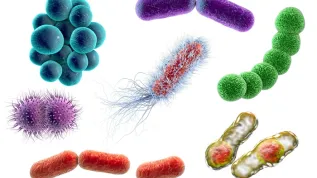
Researchers at Adam Mickiewicz University in Poznań have made the discovery that will help control the process of plant development, and allow to regulate the plant response to stress.
Scientists are participants International PhD Projects Programme of the Foundation for Polish Science. Their results have been published by a prestigious monthly EMBO Reports, reported Dominika Wojtysiak-Łańska of the Foundation for Polish Science in the release sent to PAP.
Dawid Bielewicz, Prof. Zofia Szweykowska-Kulińska and Prof. Artur Jarmołowski of the Department of Gene Expression, Institute of Molecular Biology and Biotechnology, Faculty of Biology, Adam Mickiewicz University, have discovered the important role of introns of plant micro RNA genes in regulating the level of mature micro RNA molecules. The researchers collaborated with scientists from the University of Basel (Switzerland) and the Medical University of Vienna (Austria).
Micro-RNAs are short pieces of ribonucleic acid (RNA) genes that regulate the activities of genes of all organisms with nucleus - both plants and animals. In plants, micro-RNAs control flowering time, organ development, and they are involved in plant responses to changes in the surrounding environment.
The same micro RNAs are subject to the multiplicity of mechanisms regulating the level of their expression. One of these mechanisms was discovered by Polish-Austrian-Swiss research team. In the series of experiments, they demonstrated that the presence of any protein non-coding gene fragments (introns) in the primary transcript (RNA formed on a DNA matrix) stimulates the maturation of micro RNA molecules. In addition, the researchers have shown that the process of splicing of no longer needed introns from the transcript also plays an important role in stimulating the micro-RNA biogenesis.
This means that by changing the structure of the micro-RNA genes it is possible to regulate the level of expression of a small regulatory RNA molecules, and thus affect the development of plants and their response to adverse factors from both animate (pathogens, weeds, pests) and inanimate nature (drought, salinity) - in other words, to biotic and abiotic stresses.
Very similar results were obtained by the research team of Dr. Oliver Voinnet of the Institute of Plant Cell Biology in Strasbourg (France), in collaboration with Sascha Laubinger from the University of Tübingen (Germany), and their work was also published in the same volume of EMBO Reports.
The research was inspired by earlier research findings, including discoveries made by PhD students and employees of the Department of Gene Expression, Adam Mickiewicz University, which showed that although micro RNA molecules are very short (about 20-25 nucleotides), the genes coding these molecules in plants may even have a few thousand nucleotides. In addition, these genes showed the presence of introns. With the knowledge of the mechanisms that control the production of micro RNAs in plants it will be possible to obtain varieties with improved traits, by introducing changes affecting the production of micro-RNA into their genome.
The team of researchers from the Department of Gene Expression, led by Zofia Szweykowska-Kulińska and Artur Jarmołowski, in collaboration with researchers from IHAR Młochów and IBB PAS in Warsaw, has obtained a potato line, in which expression of the gene encoding the protein of potato (CBP80)was silenced with artificial micro RNA. This allowed to obtain potatoes more resistant to drought than the varieties with CBP80 gene expressed. This work has also been published in the prestigious "Plant Biotechnology Journal".
PAP - Science and Scholarship in Poland
pmw/ agt/
tr. RL
Fundacja PAP zezwala na bezpłatny przedruk artykułów z Serwisu Nauka w Polsce pod warunkiem mailowego poinformowania nas raz w miesiącu o fakcie korzystania z serwisu oraz podania źródła artykułu. W portalach i serwisach internetowych prosimy o zamieszczenie podlinkowanego adresu: Źródło: naukawpolsce.pl, a w czasopismach adnotacji: Źródło: Serwis Nauka w Polsce - naukawpolsce.pl. Powyższe zezwolenie nie dotyczy: informacji z kategorii "Świat" oraz wszelkich fotografii i materiałów wideo.













